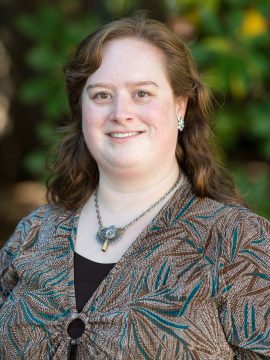Meredith Beales
Research / Teaching Area
About
Meredith Beales earned her PhD in English literature at Washington University in St Louis in 2015. Her doctoral work explored the uses and manipulations of history on the English stage; in particular, her dissertation focused on early modern English medievalism and the place of British antiquity in the theatre.
She has previously taught academic writing in both Canada and the USA.
WRDS 150 Research Area: Reading, Media, Technology, Society
Teaching
WRDS 150 courses
New Media and Society
Living in the modern world means being immersed in a sea of textual and internet-based media: we are constantly reading and responding to the infinite variations of electronic texts, videos, images, and memes. But how do the different media in which we encounter these messages change the way we respond to them? And how do our brains and our societies interact under the impact of these new media? In this section of WRDS 150 we will explore how different societies responded to new forms of communication, now and in the past. We will explore, as well, how our brains respond to these same challenges, and how the rise of electronic communication has altered (or not) the ways we respond to it and to each other.
The Shakespeare Phenomenon
In The Lion King, on the BBC, on stages and classrooms around the world—the work of William Shakespeare is often encountered as a classroom text, theatre, or film. But Shakespeare is now also used as inspiration for academic research ranging from history and film studies to archeology, mathematics, and cognitive science. In this class, we will examine how this one sixteenth-century English playwright has galvanized research in a variety of disciplines beyond the traditional starting point of English literature. We will ask why this particular writer has such a large impact on academic study, and whether, in research on, for example, supernovae or twenty-first century Afghan politics, Shakespeare has much to do with the research at all. Does simply adding the name Shakespeare make it more likely to be taken seriously? Does it matter that the motivation for an archeological dig comes from trying to prove Shakespeare wrong? What, if anything, does Shakespeare have to do with the research done in his name?
No prior knowledge of Shakespeare is expected, nor will we be reading his literature (the plays or poems themselves) in WRDS 150.
